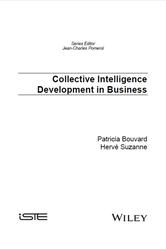Collective Intelligence Development in Business, Bouvard P., Suzanne H., 2016.
First of all, let us start at the beginning: who is this book intended for? Generally, for any person who needs a group to reach their objectives; so, mainly people working in a business, whether it is private or public. That is the framework of our contributions. Peripherally, this book may also benefit people in charge of the development of a sports team. Lastly, it would also be possible to apply our comments to private affairs, like marriages and families.

The causes of Collective Unintelligence.
Ego is probably the foremost cause. We do not expect you to banish Ego, which would be absurd. Instead, we will explain how Ego can produce Collective Unintelligence. Ego becomes counter-productive when it is built
on the wrong bases, making it so that we always want to establish our power by demonstrating that we are correct, that we know more than others, and. as a result, that we are superior to others and supremely indispensable. "You cannot be right, because I am right!” From that moment on, it becomes a question of opposing the action of whoever is in a position to challenge our authority, regardless of the domain. In this case, any objection is seen as an aggression. In other words, this person will impoverish the group in order to distinguish themselves and reassure themselves of their inherent value. This method of affirming oneself in a Company is as common as it is destructive for the wealth of the system. The problem is even more critical because it is not simply individual and behavioral, in the sense that it is not an isolated and unfortunate event. These authoritarian behaviors find their source in the global education system and are still largely practiced today, contributing to a culture of innovation that is particularly fallible (see the notions of Knower/Leamer). For example, did you ever receive a good grade at school for asking a good question? School conditions us to always show that we know how to find answers, never that we know how to think about these questions intelligently, work in groups, be a contributor, help others to develop their own skills, tolerate and encourage difference, seek out alternatives and plurality, etc. Unfortunately, all throughout their professional life, many people endeavor to reproduce a teacher-student relationship. Fortunately, nowadays, some teachers are making a difference by putting more emphasis on group work in their teaching methods, for instance. On this subject, we think that tilings are still moving too slowly, and not definitively enough.
Contents.
Introduction.
Chapter 1. Relevance and Foundations of Collective Intelligence.
1.1. Adapting to a world in complete transformation.
1.2. The pillars of a company in development, the foundations of Collective Intelligence.
1.3. Conclusion.
Chapter 2. People: The Heart of the Collective Intelligence Development Process.
2.1. Collective Intelligence: a largely untapped resource.
2.2. Lack of Collective Intelligence: causes and consequences.
2.2.1. The causes of Collective Unintelligence.
2.2.2. The consequences of Collective Unintelligence.
2.3. Five good reasons to raise the level of Collective Intelligence.
2.3.1. Getting away from Collective Unintelligence.
2.3.2. Making infrastructure more permeable.
2.3.3. Less individualism, more collective work and less control.
2.3.4. Increasing the intangible wealth of a company.
2.3.5. To implement change.
2.3.6. Conclusions about the reasons to increase the level of Collective Intelligence.
2.4. Collective Intelligence: an obvious choice faced with a fundamental paradox.
2.4.1. The paradox.
2.4.2. Consequences of this paradox: the small range of personalities present in companies.
2.4.3. Conclusion: the necessity of understanding diversity to move toward complementarity.
Chapter 3. Developing Collective Intelligence: Understanding People and Diversity.
3.1. Diversity? A matter of interpretation!.
3.1.1. Report of the mechanism of interpretations.
3.1.2. The devastating effects of interpretation on Collective Intelligence – the necessity of practicing scientific reasoning.
3.2. Understanding people through perception filters.
3.2.1. The obvious part of perception filters: exogenous filters.
3.2.2. The less obvious part of perception filters: endogenous filters.
3.2.3. Filters in the service of Collective Intelligence.
3.2.4. Why do some personalities seem difficult to you?.
3.3. Diversity and stress: different survival behaviors.
3.3.1. The origin of survival behaviors.
3.3.2. How do survival behaviors manifest?.
3.3.3. Main causes of survival behavior.
3.3.4. Survival behaviors and adaptation.
3.4. Conclusion on the elements of diversity.
Chapter 4. What is Leadership? A Note on Works about Leadership and a Tentative Definition of Leadership.
4.1. A note on works about leadership.
4.2. Tentative definition of leadership.
4.3. Three premises of leadership.
4.3.1. Leadership is relational.
4.3.2. Leadership is a-hierarchical.
4.3.3. Leadership is contextual.
4.4. Links between Collective Intelligence and Leadership.
4.4.1. What are the links?.
4.4.2. Possible deviations.
4.4.3. Conclusion on the links between Collective Intelligence and Leadership.
4.5. Leadership, to mediate between opposing sides.
4.6. Leadership: transcending organizational or cultural differences.
4.6.1. Leadership and organization: example of a matrix organization.
4.6.2. Leadership: overcoming cultural differences.
4.7. Conclusions about leadership.
Chapter 5. Postures and Roles of a Leader to Develop Collective Intelligence.
5.1. Introduction: learning to be a leader.
5.2. The postures of a leader.
5.2.1. Behaving like a learner.
5.2.2. Demonstrating responsibility.
5.2.3. Treating other people as equals.
5.3. The roles of a leader, in the service of Collective Intelligence.
5.3.1. Role of a leader in relation to the Vision.
5.3.2. Role of a leader in relation to the Structure.
5.3.3. Role of a leader in relation to individuals and their skills.
5.3.4. Main actions of a leader, manager or non-manager, over individuals and their skills.
Chapter 6. The Skills of a Leader in the Service of Collective Intelligence.
6.1. Being a leader: a sum of personal skills for self-control.
6.1.1. Ensuring maximum mobility of the filter slider.
6.1.2. Knowing yourself and controlling your impact.
6.1.3. Ensuring an emotional/rational balance.
6.1.4. Appearing both close and distant.
6.1.5. Developing a No. 10 Ego.
6.1.6. Being perceived as authentic: a must!.
6.1.7. Getting rid of authoritarianism.
6.2. Being a leader: the sum of relational skills to influence.
6.2.1. The criteria of influence.
6.2.2. The fundamentals of successful communication.
6.2.3. Practicing feedback: a relational technique.
6.2.4. Using communication techniques to make people accept responsibility.
6.2.5. Public speaking.
6.2.6. Practicing “real delegation”.
6.2.7. Being proactive.
6.2.8. Taking care to motivate people according to individual expectations.
6.2.9. Coaching when necessary.
6.2.10. Conducting difficult conversations.
6.3. Being a leader: creating sense.
6.3.1. The question of context and its impact.
6.3.2. What to observe when studying context?.
Conclusion.
Bibliography.
Index.
Бесплатно скачать электронную книгу в удобном формате, смотреть и читать:
Скачать книгу Collective Intelligence Development in Business, Bouvard P., Suzanne H., 2016 - fileskachat.com, быстрое и бесплатное скачивание.
Скачать pdf
Ниже можно купить эту книгу, если она есть в продаже, и похожие книги по лучшей цене со скидкой с доставкой по всей России.Купить книги
Скачать - pdf - Яндекс.Диск.
Дата публикации:
Теги: учебник по бизнесу :: бизнес :: Bouvard :: Suzanne
Смотрите также учебники, книги и учебные материалы:
Следующие учебники и книги:
Предыдущие статьи:












